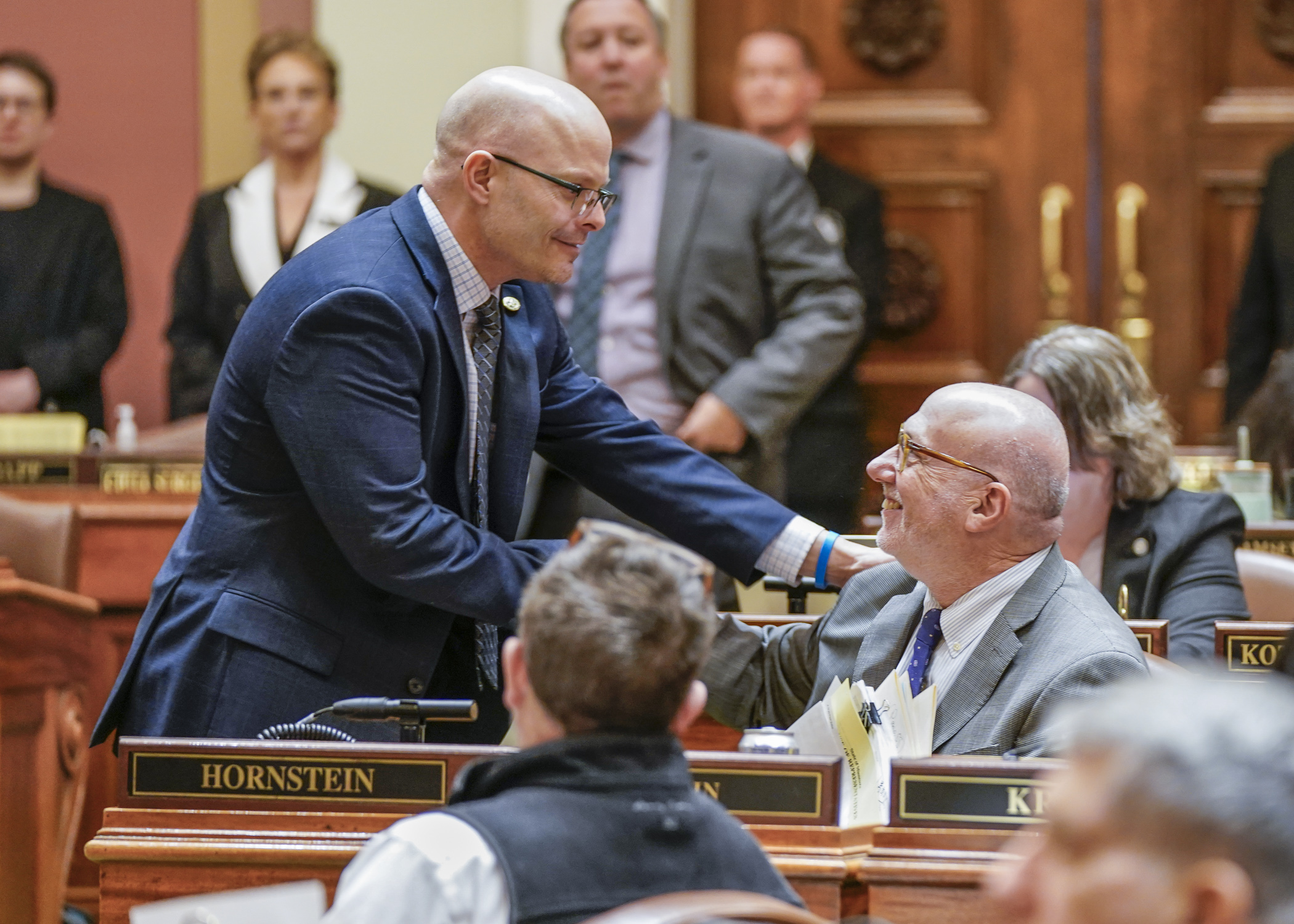House passes transportation bill with billions in spending, increased user fees

Legislators on both sides of the aisle agree the state’s transportation needs are great. But they disagree on how those needs should be met.
On a 71-59 vote, the House passed HF2887, as amended, Wednesday. It would provide $8.8 billion in spending on roads, bridges, and transit systems in the upcoming biennium. Fees and taxes would also rise.
“This bill is a pathway to a better life in job-creating, commerce-promoting environmentally beneficial transportation systems,” Rep. Frank Hornstein (DFL-Mpls) said in a statement. He sponsors the bill that he says would respond to significant needs that have piled up over the years and have only become more expensive and can’t be addressed without new revenue.
It’s been 15 years since transportation revenue was increased. It took a tragedy then.
The Legislature has increased transportation revenue twice since 1988. The last time was in 2008, months after the Interstate 35W bridge collapse that claimed 13 lives.
“We are in a similar place as we were then,” Hornstein said.
Among new transportation revenue sources would be:
- redirecting sales tax dollars from vehicle repair and replacement parts from the General Fund into roads;
- changing registration fees and increasing the motor vehicle sales tax rate, expected to raise about $300 million per year;
- adding a 75-cent delivery fee; and
- a 0.75% metro area sales tax increase to fund transit improvements and operations.
[MORE: Download the spreadsheet]
The delivery fee is expected to raise between $160 million and $180 million annually. Merchandise exempt from sales tax — except clothing — would also be exempt from the fee. So would businesses with retail sales less than $1 million annually.
Sales tax revenue would be used to create a transit intervention program to enhance safety, enforce rules and offer customer service; fund a transit signal priority system; enhance Metro Mobility services; further fund suburban micro-transit and authorize a fare elimination pilot program.
New revenue is needed to address potholes, congestion and safety issues in each legislator’s district, added House Majority Leader Jamie Long (DFL-Mpls). “The easy thing to do is pretend we don’t have a problem with funding those needs – to pretend one-time money can fix problems that are not one-time problems.”
Republican lawmakers balked at the proposed revenue raisers.
Rep. Jon Koznick (R-Lakeville) said Minnesotans would be run over by $3.5 billion in higher transportation taxes included in the bill. He takes particular issue with the sales tax proposal, arguing counties surrounding Hennepin and Ramsey would be overpaying compared to transportation dollars spent in their communities.
Greenhouse gas emission impact
Transportation is the No. 1 contributor to greenhouse gas emissions, Hornstein said. The bill would help address that by requiring the Department of Transportation to consider projected greenhouse gas emissions and vehicle miles traveled in its project assessment process.
Metropolitan area communities would also have to include climate action along with transportation and wastewater plans, which is a responsible and flexible way for the Metropolitan Council to build climate considerations into existing and well-known comprehensive planning processes, said Rep. Larry Kraft (DFL-St. Louis Park).
Rep. Nolan West (R-Blaine) said the provision would make it much harder to build roads in the state because any new road project would increase vehicle miles traveled. He said there’s no money provided in the bill for mitigation projects.
Other provisions in the bill would:
- establish a Metropolitan Council governance task force;
- aim to make it easier to get driver’s licenses;
- establish a Traffic Safety Advisory Council;
- allow some race and ethnicity data to be collected from driver’s license applicants on a voluntary basis;
- create a Highway for Habitat program;
- adjust the Corridors of Commerce scoring system aiming to improve regional balance; and
- prohibit holding a cell phone while driving.
The bill would authorize $217.6 million in trunk highway bonds to the Department of Transportation to provide $87 million for department facilities, $80 million high priority bridges, and $50 million for the Corridors of Commerce program.
Among General Fund expenditures would be:
- $214.4 million for matching federal discretionary grants through the Infrastructure Investment and Jobs Act;
- $194.3 million for the Northern Lights Express passenger train to run between Duluth and Minneapolis;
- $25 million for high-priority intersection conversions, which will be directed following an adopted amendment to Highway 65 in Anoka County;
- $25 million for improvements and redesign around the State Capitol; and
- $13.6 million for electric vehicle infrastructure.
Related Articles
Search Session Daily
Advanced Search OptionsPriority Dailies
Speaker Emerita Melissa Hortman, husband killed in attack
By HPIS Staff House Speaker Emerita Melissa Hortman (DFL-Brooklyn Park) and her husband, Mark, were fatally shot in their home early Saturday morning.
Gov. Tim Walz announced the news dur...
House Speaker Emerita Melissa Hortman (DFL-Brooklyn Park) and her husband, Mark, were fatally shot in their home early Saturday morning.
Gov. Tim Walz announced the news dur...
Lawmakers deliver budget bills to governor's desk in one-day special session
By Mike Cook About that talk of needing all 21 hours left in a legislative day to complete a special session?
House members were more than up to the challenge Monday. Beginning at 10 a.m...
About that talk of needing all 21 hours left in a legislative day to complete a special session?
House members were more than up to the challenge Monday. Beginning at 10 a.m...